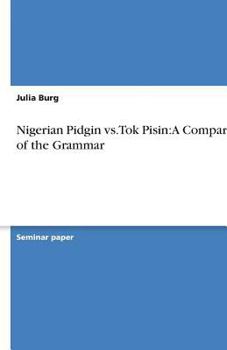Nigerian Pidgin vs. Tok Pisin: A Comparison of the Grammar
Seminar paper from the year 2006 in the subject English Language and Literature Studies - Linguistics, grade: 2,3, University of Freiburg (Englisches Seminar), course: Pidgins and Creoles, language: English, abstract: 1. Introduction Nigeria and Papua New Guinea are two of many countries which have adopted English as their main language. But having so many other, substrate languages influencing the development of a English-speaking country, two major pidgin languages developed: Nigerian Pidgin and Tok Pisin. If one wants to compare these two pidgins with each other, it seems almost inevitable to consider their great geographical distance as well as their historical differences. But my intent in this work is not to elaborate on the status and function and development of the two pidgins but on their differences in grammar. Therefore I'll mainly focus on the noun phrase and the verb phrase. 2. Morphology 2.1 Plural marking on nouns in Tok Pisin The majority of the English based Creole and Pidgin languages both at the Atlantic coast and the South Sea waive marking plurality on nouns or rather use it very optionally. Thus, the same applies to Nigerian Pidgin and Tok Pisin. But if there occurs the need to make a clear distinction between singular and plural both pidgins absolutely dispose of a pluralizer. In Tok Pisin the most common way to express plurality is by the use of the particle ol, which at the same time is identical to the third person plural pronoun. Ol, clearly derived from the English 'all', occurs before the noun as opposed to the post-nominal English plural marking suffix -s. (1) Mi lukim dok. (2) Mi lukim ol dok. I saw the dog. I saw the dogs. (Siegel) But according to Geoff P. Smith (2002), " there is a great deal of variability, and the presence or absence of ol is still somewhat unpredictable" (p 66). This can clearly be seen in the following example, in which only one noun takes the pr
Format:Paperback
Language:English
ISBN:3640386426
ISBN13:9783640386420
Release Date:July 2009
Publisher:Grin Verlag
Length:20 Pages
Weight:0.09 lbs.
Dimensions:0.1" x 5.8" x 8.3"
Customer Reviews
0 rating





